
To be honest, this was bound to happen. The huge interest in the popular IT sphere, powerful advertising of courses promising to turn a beginner into a developer in a month and get them a job with a salary in thousands of dollars — all this could not fail to overheat the market, sooner or later.
The insane popularity of some professions has created a somewhat distorted picture of the IT industry, in which it seems that only programmers, testers, and web designers work. In fact, IT includes many varieties of businesses and hundreds of professions. The sphere is represented not only by product companies producing software or games — it also includes hosting providers and internet providers, hardware manufacturers, cybersecurity agencies, and many others. They did not receive as much attention, their employees did not have such high salaries with a low entry threshold — and for them, this to some extent became an advantage and a guarantee of stability.
So, it can be said that the IT job market is experiencing turbulence, but not a catastrophe. In order not to feel deceived, job seekers need to change the criteria for choosing a profession in IT and forget about the golden mountains.
For some time, advertisements will continue to promise magical earnings almost effortlessly, but the reality is this: it is becoming increasingly difficult for a newcomer without experience in the IT field to find a job. Let's find out what salaries are in the industry now, how demand for specialists has changed, and which IT specialties to study in 2024 to get the desired job.
Salaries in the IT industry are decreasing — the "gold rush" is over
Right now, the game development market is experiencing a wave of layoffs. Also, not the best times are for large outsourcing companies, which traditionally have been more successful, larger, and more common in our country than product companies. They now simply look like more risky contractors to potential clients. Covid, war, the implementation of artificial intelligence, a huge supply from yesterday's course attendees without experience — there are many reasons.
The first and main consequence is that getting a job after hastily completed courses in popular fields — QA, frontend, design, etc. — is much more difficult. In particular, last summer, according to DOU data, there were 44 candidates competing for the position of Manual QA. This does not mean that there is no work for such specialists at all — it's just that experienced and well-informed ones are more successful, and it will be difficult for newcomers.
The second consequence is that salaries have dropped somewhat. Here is the statistics from work.ua, and it doesn't look like golden mountains.
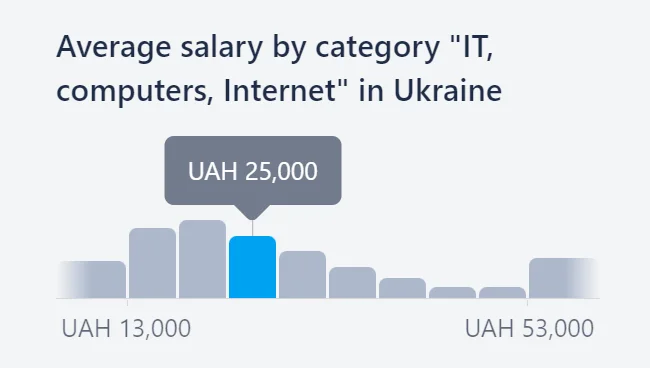
And here's a really sad vacancy from the same source. Agree, you can earn just as much without any additional training... and practically anywhere.

In fact, in terms of salary levels, marketers of fast courses have always been a bit misleading. Typically, advertisements indicated a salary at least at the mid-level, which is not typically earned right from the start. The fact that a graduate is likely to start as a trainee with a very small compensation, or as a junior, earning half as much, is overlooked. The winter survey on DOU shows that this winter, the median salary in the industry on average dropped by $135. Juniors will be earning less than $1000 in almost all directions, while trainees or interns will receive around $300.
IT Specialties to Focus on in 2024
However, even decreased earnings are still earnings. And here, the forefront is not the elusive possibility of earning many thousands of dollars someday, but the prospect of having a decent salary for many years, not the smallest in the market.
It is necessary to take into account the general tendency: the more a specialty lends itself to division into routine operations and automation, the lower the entry threshold, the more likely it is that getting a job will be difficult. If this is a popular programming language (Python, JS) — there are many experts, but few positions, as things are being automated, and specialists are also being reduced.
Chances of Getting Hired are Increasing:
-
good English language skills, regardless of the position you are applying for;
-
experience or additional qualities that distinguish you from other applicants (for example, if you have previously worked in IT in a non-technical role, you have a good understanding of processes);
-
knowledge in related professions (for example, for a tester, it would be a plus to know at least one programming language, there are courses like "programming for PM", etc.);
-
willingness to learn quickly;
-
willingness to consider less popular specialties, which involve a more gradual and complex entry.
Additionally, an additional source of vacancies has appeared in the industry — the Armed Forces of Ukraine. There, there probably won't be sky-high salaries. On average, it is 20-30 thousand hryvnias — not at all the dream salary that it is portrayed as in IT (although it can be more than 100 thousand if you work from scratch). Here's a screenshot of a fragment of the job list from LobbyX: they need everyone, up to game designers.
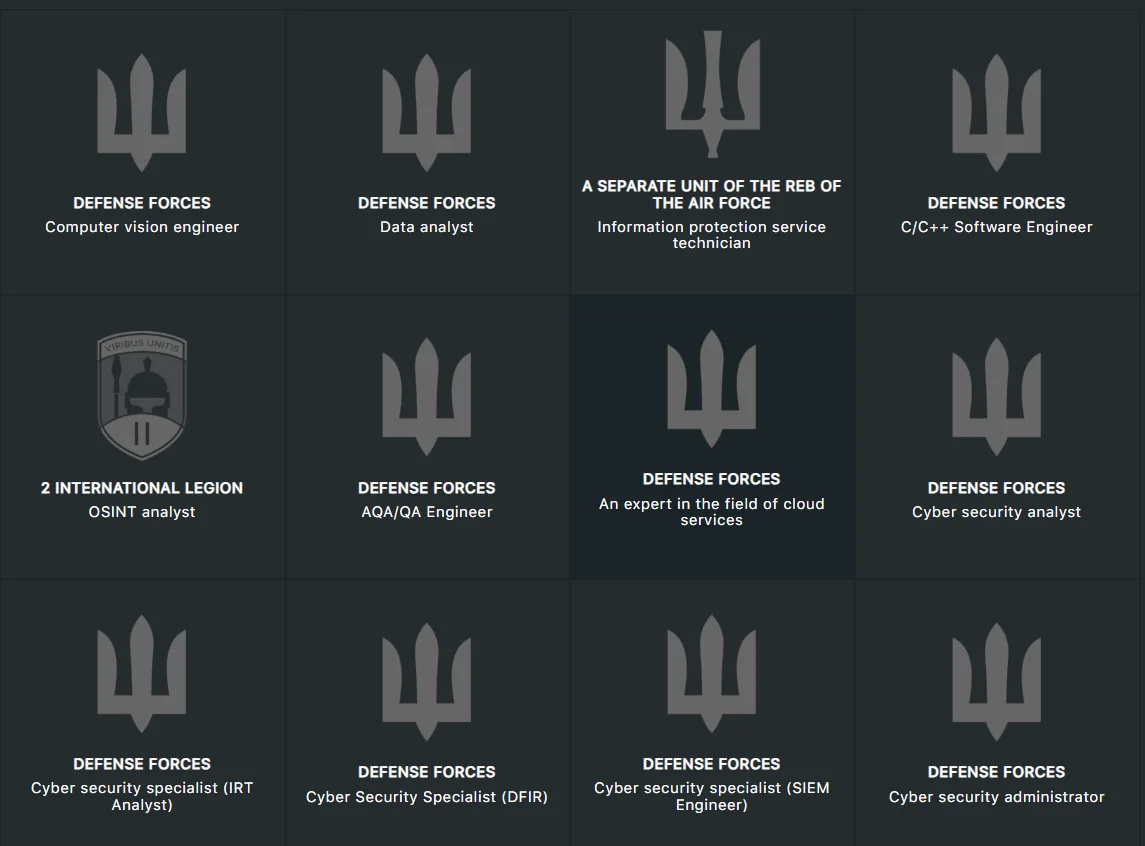
In most cases, however, such a vacancy will allow you to serve in your field and contribute significantly to Ukraine's victory.
Finally, people who can work with cloud solutions and hardware are in great demand — engineers, cloud administrators. If we are talking about helping the army, they will be looking for engineers to set up drones.
Read also: Free IT courses for Ukrainian military
Here are the specialties in demand in the market:
Marketing
Interestingly enough, non-technical specialties, including marketing, are in demand. For example, according to Djinni statistics, marketers receive the most responses to their resumes and job offers.
However, it is important that this is not just any marketer, but a marketer capable of working with the product and understanding its development. For example, Product Marketing Manager, Growth Marketing Manager, etc. These are specialists who can work at the intersection of marketing and product development, ensuring synchronicity between them. Since these specialties are relatively young, the list of responsibilities will vary from company to company: everyone has their own idea of how such marketers should work.
Cybersecurity
This is a very relevant industry right now, and specialists in this field are needed both in the civilian and military markets.
Everyone has probably heard that large companies and government institutions suffer from hackers as much as they do from missiles. The future doesn't look cloudless yet, so the demand for specialists will only grow.
Hardware and Cloud Infrastructure
Despite some hiring specialists considering regular system administrators not very much in demand, people who can build networks, maintain cloud and server operations are always needed. This includes:
-
DevOps;
-
Cloud solution architects.
The more companies move services and workstations to the cloud, the more clouds are needed in general, the more jobs there will be in this market. However, an office sysadmin or a specialist who can administer dedicated servers is needed in any company.
Here's some more statistics from Work.ua:
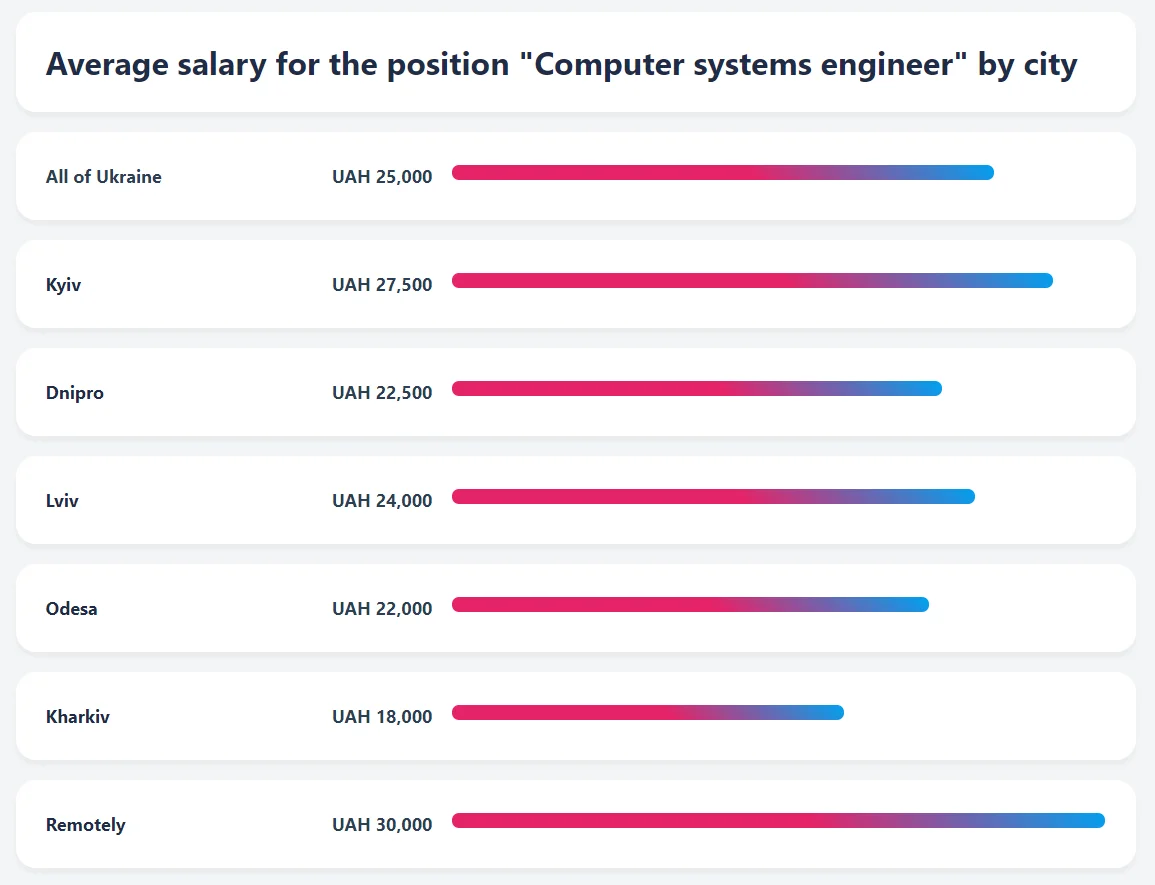
Here is a quite real vacancy:
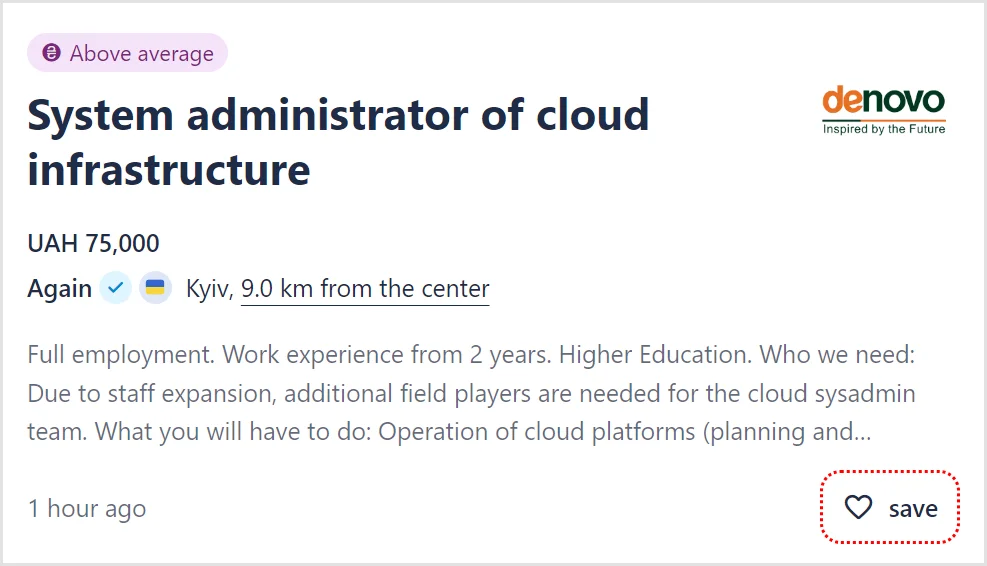
This is a challenging specialty, judging by the list of required skills. However, it is possible to gradually develop in this field, and unless humanity invents a way to host its applications and storage without using servers, the demand is unlikely to disappear.
Read also: Who is a system administrator and how to become one
Artificial Intelligence and Machine Learning
Of course, we couldn't skip this topic because it's the one that has been generating the most discussions lately. According to Genius.Space, the global AI market is $136 billion and growing, with more and more companies wanting to have AI assistants at work. What vacancies are there: machine learning engineer working directly with language models, and software architect creating infrastructure for language model operation.
This is also not an easy job, here is an example of a fairly typical list of requirements:

However, there is every reason to believe that there will be work in this field tomorrow, the day after tomorrow, and in a year: artificial intelligence is developing, and people are developing it.
Data Analytics
There are plenty of vacancies for analysts, particularly for data analysts. These specialists help to build long-term strategies for sales, organization of work, advertising, etc., and there is demand for them.
The task of an analyst is to process large databases and turn them into understandable business information about trends, user impressions, etc.
Analysts need:
-
a mathematical background;
-
knowledge of at least one programming language (Python is less in demand);
-
knowledge of SQL;
-
visualization skills;
-
understanding of metrics;
-
ability to conduct A/B tests.
And of course, English is essential. With all these skills, you can expect an average salary of 30,000 hryvnias (according to Work.ua data for the country).
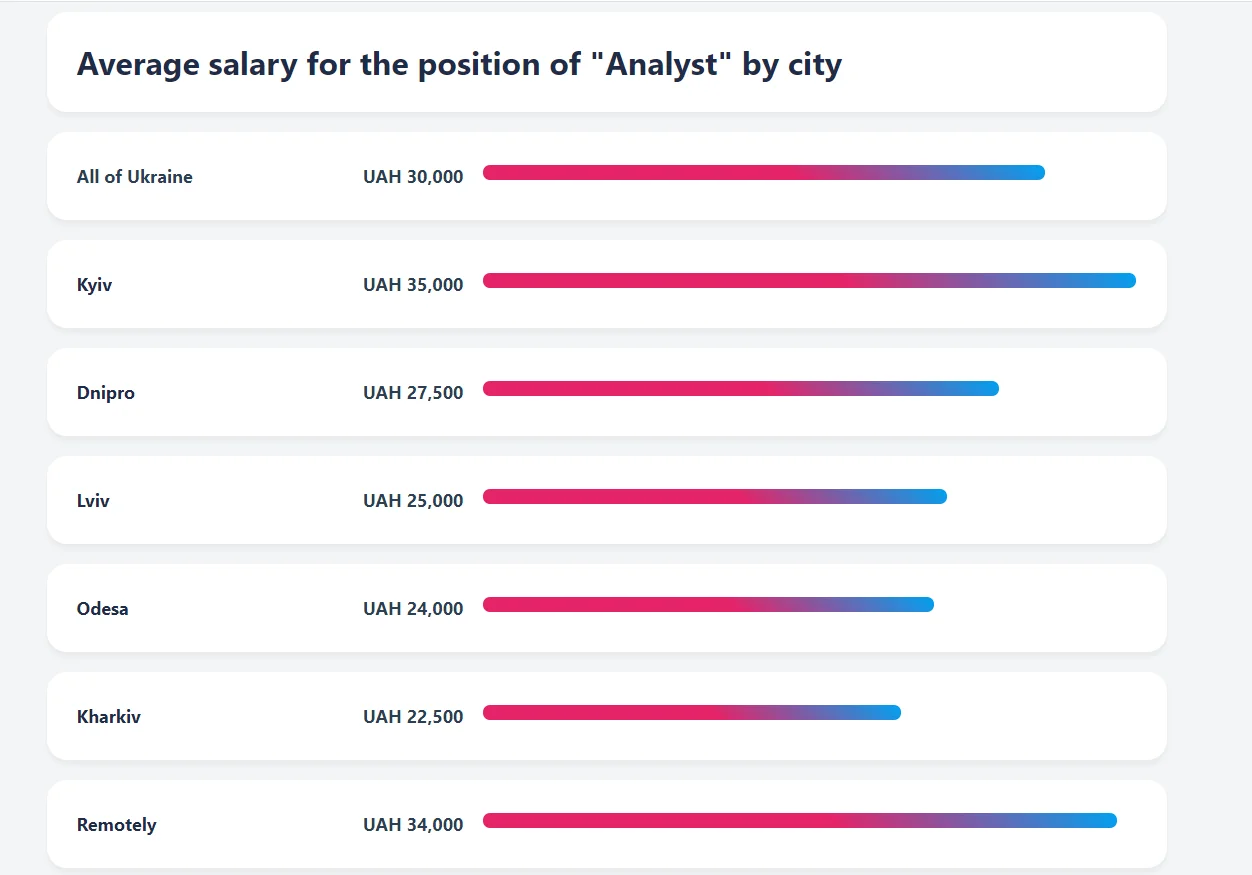
Should you consider studying in the IT industry
Currently, most professionals agree that the gold rush with relatively easy money is over. But bubbles never inflate forever.
Soon, working in IT will no longer be a fairy tale with a sky full of diamonds and a bathtub of champagne. These will be ordinary professions where you can earn higher salaries with unique knowledge and good skills, or you can work in the middle range and earn decent pay compared to other professions in the market. And, like in any profession, the choice should be made considering whether you like it and whether you are willing to do it for years.
If you really want to be a tester or programmer, you love the process, and you enthusiastically learn new information, then it's worth trying. The decrease in the number of vacancies does not mean that there are none at all. A good specialist who truly loves their work and constantly improves will always be in demand.
However, if it's solely about money, it's time to look for new trending directions. It's not a disaster: in any case, IT has always been a dynamic industry where you had to constantly retrain and adapt to changes. It will be the same now, just a little different.










